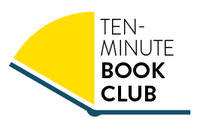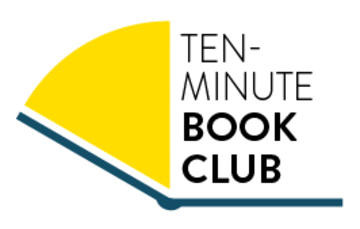Ten-Minute Book Club
Project Lead:
College Lecturer in English
Keble College
Academic partner:
Professor Kirsten Shepherd Barr
Professor of English and Theatre Studies; Tutorial Fellow
Technical Manager:
Researcher, writer, designer
Collaborators:
BBC Oxford interview:
About the Project:
Ten-Minute Book Club will build on the success of an experimental book club created to respond to pandemic pressures in 2020, using the digital and literary together to reimagine virtual connection. Through extending a flagship project set up in 2020, this project will reimagine literature discovery and challenge negative use of AI for social connection - the ideas of 'vanishing attention spans' and 'doom scrolling' associated with social media feeds - by asserting the interest and power of reading short texts. In Ten-Minute Book Club, participants engage closely with ten-minute texts, and through these little moments great connections are possible.
This project aims to take on two great bogeymen of AI futures: cynically-used book-sale algorithms and flash-in-the-pan hashtag discourse. In their place this project offers free and unexpected literary discoveries, and a rich book club experience that turns on just a page or two of text. The symmetry between literature and AI is profound: both allow us to move through virtual worlds created by signs alone. Reading literature allows us to adapt to the imagined life, and in so doing instructs us in the political work of realising new ways of putting AI to good purposes. Reading allows us to adapt to the unreal, the imagined life, and in so doing instructs us in taking agency in narratives about the futures of humanity. Literature is, in the words of Terence Cave, a "prime instrument of cultural improvisation". Talking about reading literature turns these abilities from private to public use, and begins the political work of realising new ways of putting AI to good purposes.
This project is an ambitious expansion of an existing proof-of-concept. A pilot Ten-Minute Book Club project, spearheaded by the Head of the Humanities Division and joining work by LitHits with Great Writers Inspire and Writers Make Worlds, launched as an online public outreach idea hosted on the Faculty of English website in 2020, designed to fight burnout and isolation through literature. English Faculty postholders contributed brilliant new introductions and materials for each week's text, which were excerpted and curated by LitHits alongside free access to the full text, to create DIY kits for book clubs where the 'book' is a ten-minute snippet drawn from a politically powerful and diverse set of free texts. The political context of the original project was vital to its final iteration. In the urgent context of Black Lives Matter protests in Summer 2020, the curation of Season 1 was informed by the historical importance of writers of colour in English and foregrounds texts that demonstrate the very long history of calls for justice in relation to race. The final list for each season is also intended to be a diverse mix of literary forms and genres: all public domain so the full texts can be openly accessible. Season 1 writers were W.E.B. Du Bois, Toru Dutt, Mary Prince, Geoffrey Chaucer, Patience Agbabi (who gave permission to use her text, ‘Emily’, for this project), Olaudah Equiano, Katherine Mansfield, Elizabeth Keckley, James Joyce, Mary Shelley, and Charlotte Brontë.
Seasons 2 and 3 of the Ten-Minute Book Club will be coming soon, with Season 2 planned to launch in Summer 2022. Thanks to support by the Minderoo-Oxford AI challenge, we have also been able to expand our curation base and take a far more open approach to the texts included in the book club.
The first Ten-Minute Book Club analytics and collected testimonies indicated that the project had struck a chord with post-GCSE teachers and learners. These teachers and learners are the new target audience for Seasons 2 and 3, which will also involve a series of invited book club live events.
Ten-Minute Book Club: Season 2 digital launch, 30th September 2022
The LitHits and Faculty of English outreach collaboration, Ten-Minute Book Club will be launching its next 10 week season on Friday 30th September. A new text and introduction will be released every Friday until the end of Michaelmas term, beginning with Claude McKay. Other featured writers are Hannah Allen; Frances Ellen Watkins Harper; Wilkie Collins; Alice Dunbar Nelson; Sinclair Lewis; William Langland; Amy Levy and Hans Christian Anderson alongside Rivers Solomon and Monique Roffey’s mermaids.
Each season has ten literary excerpts that you can read in just ten minutes. The extracts have been chosen by Oxford academics, and are paired with free resources and introductions by experts suggesting themes or contexts to inform the reading experience.
This project runs in conjunction with book club discussions with teachers of English (post-GCSE) from across the UK, and is supported by a Minderoo-Oxford grant. Season 3 is currently in production.
Read more about the new season here.
Oxford’s ‘Ten-Minute Book Club’ Season 3: a new set of quick ‘deep dives’ into great literature.
Ten-Minute Book Club run by Dr Alexandra Paddock, Professor Kirsten Shepherd-Barr and Dr Erica Lombard launches its third season today, Monday 13th February (UK school half-term), to introduce a new 12-week series of curated short-form texts as an invitation to great conversations about literature.
The first instalment of Season 3 of the book club focuses on The Moonstone by Wilkie Collins, one of the earliest detective novels. The novel’s central stolen diamond is introduced through a postcolonial lens by doctoral candidate, Helen Dallas.
Season 3 will continue work begun by the Ten-Minute Book Club second season of late 2022, which released light-touch deep dives into the work of Claude McKay, Alice Dunbar Nelson, Amy Levy, George Meredith, Frances Watkins Harper, Sinclair Lewis, William Langland, and Hannah Allen. Each week there is a DIY kit for book club discussion, where the ‘book’ is a ten-minute online snippet, designed for school and general readers. An introduction by an academic suggests themes or contexts to think about, ideas for further reading around the book and a free link to the full text (meaning that all texts must be out of copyright). The books come from a wide selection of genres, including essay collections, poetry and short stories, and are written in a variety of Englishes. It is a core mission of the project to showcase global English literatures, and to consider minoritized experience and postcolonial questions in the way these texts are framed.
Ten-Minute Book Club Season 2 also included a series of online live book clubs with UK English teachers, some of whom are now running their own ten-minute book clubs in schools using the project. The biggest of these events was a 50-person ten-minute book club at the A level ‘Frankenstein Revisited’ Study Day on 20 October. The insights of these meetings are being incorporated into the Ten-Minute Book Club website to transform the project into a co-created initiative. Teachers' book club events will begin again in Spring alongside Season 3.
The Ten-Minute Book Club, along with the LitHits project that inspired it, is a permanent installation in the Weston Library’s ‘Space for Reading’ in the Blackwell Hall.
The resources in the Ten-Minute Book Club were created by Oxford's Great Writers Inspire, Writers Make Worlds and LitHits projects, and supported by the Faculty of English and the Humanities Division at Oxford University. Season 2 and 3 are made possible thanks to a Minderoo-Oxford Challenge Fund in AI Governance large grant.
Browse the Ten-Minute Book Club >>
Contact:
alexandra.paddock@ell.ox.ac.uk

This project is funded by the Minderoo AI Challenge Fund.
Part of the Humanities Cultural Programme, one of the founding stones for the
future Stephen A. Schwarzman Centre for the Humanities.



